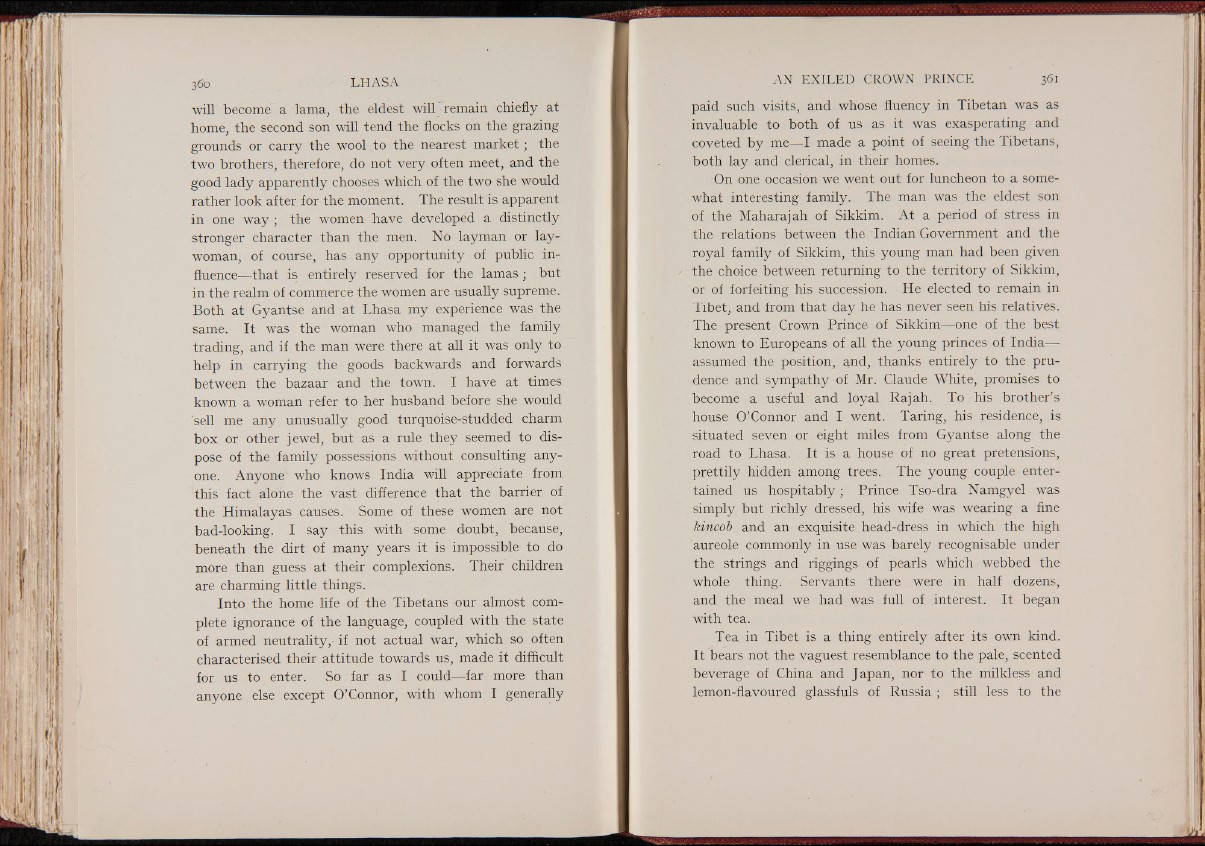
will become a lama, the eldest will remain chiefly at
home, the second son will tend the flocks on the grazing
grounds or carry the wool to the nearest market; the
two brothers, therefore, do not very often meet, and the
good lady apparently chooses which of the two she would
rather look after for the moment. The result is apparent
in one w a y ; the women have developed a distinctly
stronger character than the men. No layman or lay-
woman, of course, has any opportunity of public influence—
that is entirely reserved for the lamas ; but
in the realm of commerce the women are usually supreme.
Both at Gyantse and at Lhasa my experience was the
same. It was the woman who managed the family
trading, and if the man were there at all it was only to
help in carrying the goods backwards and forwards
between the bazaar and the town. I have at times
known a woman refer to her husband before she would
‘sell me any unusually good turquoise-studded charm
box or other jewel, but as a rule they seemed to dispose
of the family possessions without consulting anyone.
Anyone who knows India will appreciate from
this fact alone the vast difference that the barrier of
the Himalayas causes. Some of these women are not
bad-looking. I say this with some doubt, because,
beneath the dirt of many years it is impossible to do
more than guess at their complexions. Their children
are charming little things.
Into the home life of the Tibetans our almost complete
ignorance of the language, coupled with the state
of armed neutrality,- if not actual war, which so often
characterised their attitude towards us, made it difficult
for us to enter. So far as I could— far more than
anyone else except O’Connor, with whom I generally
paid such visits, and whose fluency in Tibetan was as
invaluable to both of us as it was exasperating and
coveted by me— I made a point of seeing the Tibetans,
both lay and clerical, in their homes.
On one occasion we went out for luncheon to a somewhat
interesting family. The man was the eldest son
of the Maharajah of Sikkim. At a period of stress in
the relations between the 'Indian Government and the
royal family of Sikkim, this young man had been given
the choice between returning to thé territory of Sikkim,
or of forfeiting his succession. He elected to remain in
Tibet, and from that day he has never seen his relatives.
The present Crown Prince of Sikkim— one of the best
known to Europeans of all the young princes of Indian-
assumed the position, and, thanks entirely to the prudence
and sympathy of Mr. Claude White, promises to
become a useful and loyal Rajah. To his brother’s
hous,e O’Connor and I went. Taring, his residence, is
situated seven or eight miles from Gyantse along the
road to Lhasa. It is a house of no great pretensions,
prettily hidden among trees. The young couple entertained
us hospitably ; Prince Tso-dra Namgyel was
simply but richly dressed, his wife was wearing a fine
kincob and an exquisite head-dress in which the high
aureole commonly in use was barely recognisable under
the strings and riggings of pearls which webbed the
whole thing. Servants there were in half dozens,
and the meal we had was full of interest. It began
with tea.
Tea in Tibet is a thing entirely after its own kind.
It bears not the vaguest resemblance to the pale, scented
beverage of China and Japan, nor to the milkless and
lemon-flavoured glassfuls of Russia ; still less to the
B a n _ _ _ _ _ _